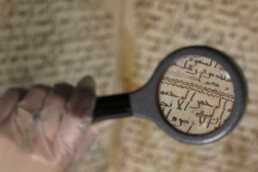“It is He who created the heavens and the earth in six periods, and His throne extends over the water, so as to test which of you does best…”
Qur’an 11:7
This post explores what God might mean by ‘waters’. As a caveat I’m not suggesting that what I’m about to present is a conclusive interpretation, it’s simply an exploration which is all we can really do with such verses, and I often enjoy intelligent godly theories presented by others. I don’t believe there’s a need to be conclusive with such reports (akhbar) – God did not provide us with the finer details precisely because He wants us to use our intellects and ponder the cosmos in a way that inspires deep reverence and awe, which is relative to the individual since the depth people require is personal.
What prompted these thoughts, as with all scholarly insights I suppose, were initial questions such as does ‘water’ here refer to the type on earth, like a lake or ocean floating about somewhere out there? Of course, put like this it sounds quite bizarre. One thing we tend to overlook when it comes to things beyond our immediate perceptions is that whilst God uses human representations for things out there (how else would humans understand what was being said?) it does not mean that their absolute reality is as humans understand the representations. Even in this verse, when God uses the term ‘throne’, no sensible person claims that God is sitting (as a human does) on a giant throne made of wood, metal or jewels which is simply floating about somewhere beyond the universe. It’d be somewhat anatopistic, that is, something out of its proper place. But then why would God choose the word throne (or ‘arsh in Arabic)? Well reasonably, because what God is literally talking about is best represented to the average human mind through a word she already recognises.
So hopefully having made that clear, what might the ‘water’ over which the throne sits be? A new experiment, the findings of which were published last week in Nature, confirms the existence of “superionic ice” with Quanta Magazine reporting that ‘Across the solar system, at least, more water probably exists as superionic ice — filling the interiors of Uranus and Neptune — than in any other phase, including the liquid form sloshing in oceans on Earth, Europa and Enceladus…All the previously known water ices are made of intact water molecules, each with one oxygen atom linked to two hydrogens. But superionic ice, the new measurements confirm, isn’t like that. It exists in a sort of surrealist limbo, part solid, part liquid. Individual water molecules break apart. The oxygen atoms form a cubic lattice, but the hydrogen atoms spill free, flowing like a liquid through the rigid cage of oxygens.’ However, ‘Depending on whom you ask, superionic ice is either another addition to water’s already cluttered array of avatars or something even stranger. Because its water molecules break apart, said the physicist Livia Bove of France’s National Center for Scientific Research and Pierre and Marie Curie University, it’s not quite a new phase of water. “It’s really a new state of matter,” she said, “which is rather spectacular.”’ To be clear, I’m not saying the water beneath the throne is superionic ice for sure but I’m exploring (as the sahabah and scholars after them would characteristically do) the idea that it could possibly be a type of superionic ice, but also quite plausibly, a completely new state of matter that we have yet to come across – or even conceive of.
Can we know more, and did the Prophet tell us anything? Well interestingly, al-Bukhari reports that the Prophet began to explain the affairs of the beginning of creation, but it was missed by Imran b. Husayn as he was called away! A delegation from Yemen came to see the Prophet saying, “We come offering peace to the messenger of God, to learn about the faith, and to ask how all of this began?” The Prophet began to explain, “God was present and there was nothing else (of the cosmos) besides Him, and the throne was above the water, and He wrote in the dhikr before everything occurred, then He created the seven heavens.” Imran b. Husayn was then called away to his camel which had run off and resultantly missed the rest of the explanation. He lamented afterwards, “I wish I had left the camel!”
We haven’t much related to us from the Prophet in regards to what the water is, and we don’t know whether he touched upon it whilst Imran b. Husayn was absent. However, it seems the conversation amongst the sahabah didn’t stop there. Sa’eed b. Jubayr relates that the prophetic companion Abdullah b. Abbas was asked in reference to this verse, “and what is the water on?” He replied, “a wind,” which if it was something he was relating from the Prophet (and not his own ijhtihad), might refer to a vast ocean of cosmic charged particles which sits under the ‘water’.
But what’s the purpose of all of this? Here we are called on to ponder the magnitude of God’s creation – we know how colossal the Pacific Ocean is, so imagine a superionic ice that extends for trillions (to the power of trillions, and far far more) lights years! To even begin to contemplate magnitude and reality here is mind-boggling, and it ought to bear on us the insignificance of man and his affairs, or the nature of the power he foolishly thinks he has. It induces a far deeper consideration of the oft-repeated phrase ‘God is great.’
In this way, the possible meaning of the continuing verse “so as to test which of you does best” is that God tells us of the throne and the waters “to try his servants to consider and deduce (values) such as His complete (divine) abilities and the resurrection of the soul” as al-Qurtubi suggests, and then to use the faculties of the intellect as Qatadah put it, to recognise God’s supreme majesty rather than ignoring what such knowledge suggests and living out a life devoid of God. al-Dah’hak opined that “does best” means offers the most appreciation,” ostensibly from considering and deducing such values. The use of the intellect and a show of appreciation to God are two fundamental principles that flow through the Book of God, and sit centrally in the meta-narrative that informs our existential purpose, something I hope to map out gradually for believers seeking a holistic understanding of their relationship and engagement with the Most High.




